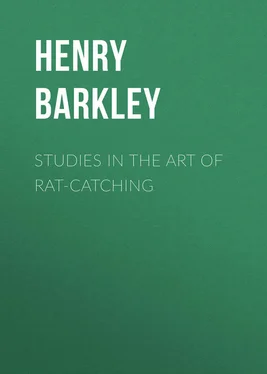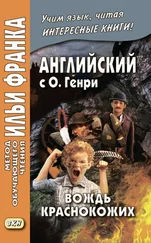Henry Barkley - Studies in the Art of Rat-catching
Здесь есть возможность читать онлайн «Henry Barkley - Studies in the Art of Rat-catching» — ознакомительный отрывок электронной книги совершенно бесплатно, а после прочтения отрывка купить полную версию. В некоторых случаях можно слушать аудио, скачать через торрент в формате fb2 и присутствует краткое содержание. Жанр: foreign_antique, foreign_prose, на английском языке. Описание произведения, (предисловие) а так же отзывы посетителей доступны на портале библиотеки ЛибКат.
- Название:Studies in the Art of Rat-catching
- Автор:
- Жанр:
- Год:неизвестен
- ISBN:нет данных
- Рейтинг книги:3 / 5. Голосов: 1
-
Избранное:Добавить в избранное
- Отзывы:
-
Ваша оценка:
- 60
- 1
- 2
- 3
- 4
- 5
Studies in the Art of Rat-catching: краткое содержание, описание и аннотация
Предлагаем к чтению аннотацию, описание, краткое содержание или предисловие (зависит от того, что написал сам автор книги «Studies in the Art of Rat-catching»). Если вы не нашли необходимую информацию о книге — напишите в комментариях, мы постараемся отыскать её.
Studies in the Art of Rat-catching — читать онлайн ознакомительный отрывок
Ниже представлен текст книги, разбитый по страницам. Система сохранения места последней прочитанной страницы, позволяет с удобством читать онлайн бесплатно книгу «Studies in the Art of Rat-catching», без необходимости каждый раз заново искать на чём Вы остановились. Поставьте закладку, и сможете в любой момент перейти на страницу, на которой закончили чтение.
Интервал:
Закладка:
I think I have enumerated all the tools required for rat-catching. I need not mention a knife and a piece of string, as all honest men have them in their pocket always, even on Sundays. Some rat-catchers take with them thick leather gloves to save their getting bitten by a rat or a ferret; but I despise such effeminate ways, and I consider he does not know his profession if he cannot catch either ferret or rat with his naked hands.
I must now turn to the subject of dogs – one far more important than either ferrets or tools, and one so large that if I went on writing and writing to the end of my days I should not get to the end of it, and so shall only make a few notes upon it as a slight guide to the student, leaving him to follow it up and work it out for himself; but in so doing I beg to say that his future success as a rat-catcher will depend on his mastering the subject.
But, before proceeding further, I am anxious to say a few words in parenthesis for the benefit of the Head Masters of our schools. Admirable as their academies are for turning out Greek and Latin scholars, I cannot help thinking a proper provision is seldom made in their establishments for acquiring a real working knowledge of the profession of a rat-catcher; and I wish to suggest that it would be as well to insist on all those students who wish to take up this subject keeping at school at least one good dog and a ferret, and that two afternoons a week should be set apart entirely for field practice, and that the cost of this should be jotted down at the end of each term in the little school account that is sent home to the students' parents. I know most high-spirited boys will object to this and call it a fresh tyranny, and ever after hate me for proposing it; but I do it under a deep sense of duty, being convinced that it is far better they should perfectly master the rudimentary knowledge of such an honest profession as that of rat-catcher, than that they should drift on through their school life with no definite future marked out, finally to become perhaps such scourges of society as M.P.s who make speeches when Parliament is not sitting. Judging from the columns of the newspapers, there must be many thousands who come to this most deplorable end; and if I can only turn one from such a vicious course, I shall feel I have benefitted mankind even more than by killing rats and other vermin.
Now I must return to the subject of dogs, and in doing so I will first begin on their masters, for to make a good dog, a good master is also absolutely necessary. Anybody that has thought about it knows that as is the master, so is the dog. A quiet man has a quiet dog, a quarrelsome man a quarrelsome dog, a bright quick man a bright quick dog, and a loafing idle ruffian a slinking slothful cur.
First of all, then, the dog's master must understand dog talk; for they do talk, and eloquently too, with their tongues, their ears, their eyes, their legs, their tail, and even with the hairs on their backs; and therefore don't be astonished if you find me saying in the following pages, "Pepper told me this," or "Wasp said so-and-so." Why, I was once told by a bull terrier that a country policeman was a thief, and, "acting on information received," I got the man locked up in prison for three months, and it just served him right. Having learnt dog language, use it to your dog in a reasonable way: talk to him as a friend, tell him the news of the day, of your hopes and fears, your likes and dislikes, but above all use talk always in the place of a whip. For instance, when breaking in a young dog not to kill a ferret, take hold of the dog with a short line, put the ferret on the ground in front of him, and when he makes a dash at it say, "What are you up to? War ferret! Why, I gave four and sixpence for that, you fool, and now you want to kill it! Look here (picking the ferret up and fondling it), this is one of my friends. Smell it (putting it near his nose). Different from a rat, eh? Rather sweet, ain't it? War ferret, war ferret! Would you, you rascal? Ain't you ashamed of yourself? War ferret, war ferret!" Repeat this a few times for two or three days, and when you first begin working the dog and he is excitedly watching for a rat to bolt, just say "War ferret" to him, and he will be sure to understand. Should he, however, in his excitement make a dash at a ferret, shout at him to stop, and then, picking up the ferret, rub it over his face, all the time scolding him well for what he has done; but don't hit him, and probably he will never look at a ferret again.
In my opinion there is nothing like a thrashing to spoil a dog or a boy; reason with them and talk to them, and if they are worth keeping they will understand and obey. Mind, a dog must always obey, and obey at the first order. Always give an order in a decided voice as if you meant it, and never overlook the slightest disobedience. One short whistle should always be enough. If the dog does not obey, call him up and, repeating the whistle, scold him with a scold in your voice . Don't shout or bawl at him for all the country to hear and the rats too, but just make your words sting . If he repeats his offence, put a line and collar on him and lead him for half an hour, telling him all the time why you do so, and he will be so ashamed of himself that the chances are he will obey you ever after.
Put yourself in the dog's place. Fancy if, when you have "kicked a bit over the traces" at school, the head-master, instead of thrashing you, made you walk up and down the playground or cricket-field with him for half an hour; but no, that would be too awful; it would border on brutality! But you would not forget it in a hurry.
We humans often behave well and do good, not because it is our duty so to do, but for what the world will say and for the praise we may get. Dogs are not in all things superior to humans, and in this matter of praise I fear they are even inferior to us. They most dearly love praise, and a good dog should always get it for any and every little service he renders to man. Remember, he is the only living thing that takes a pleasure in working for man, and his sole reward is man's approbation. Give it him, then, and give it him hot and warm when he deserves it, and he will be willing to do anything for you and will spend his life worshipping you and working for you; for better, for worse, for richer, for poorer, he is yours, with no sneaking thoughts of a divorce court in the background.
There is another thing a master should always do for his dog himself and do it with reason. See to his comfort; see that he has good food and water and is comfortably lodged. Don't let him be tied up to a hateful kennel in a back yard, baked by the sun in summer and nearly frozen in winter; often without water, and with food thrown into a dish that is already half full of sour and dirty remains of yesterday's dinner. This is not reasonable and is cruel. When he is not with you, shut him up in a kennel, big or little, made as nearly as you can have it on the model of a kennel for hounds. Let it be cool and airy in summer and snug and warm in winter; keep all clean – kennel, food, dishes, water and beds. Don't forget that different dogs have different requirements; for instance, that a long thick coated dog will sleep with comfort out in the snow, while a short-coated one will shiver in a thick bed of straw. Picture to yourself, as you tuck the warm blankets round you on a cold winters night, what your thin-coated pointer is undergoing in a draughty kennel on a bare plank bed, chained up to a "misery trap" in the back yard, which is half full of drifted snow. Think of it, and get up and put the dog in a spare loose box in the stable for the night, and have a proper kennel made for him in the morning.
I once had a favourite dog named "Rough" that died of distemper. A small child asked me a few days afterwards if dogs when they died went to heaven, and I, not knowing better, answered, "Yes"; and the child said, "Won't Rough wag his old tail when he sees me come in?" When you "come in" I hope there will be all your departed dogs wagging their tails to meet you. It will depend upon how you have treated them here; but take my word for it, my friend, you will never be allowed to pass that door if the dogs bark and growl at you.
Читать дальшеИнтервал:
Закладка:
Похожие книги на «Studies in the Art of Rat-catching»
Представляем Вашему вниманию похожие книги на «Studies in the Art of Rat-catching» списком для выбора. Мы отобрали схожую по названию и смыслу литературу в надежде предоставить читателям больше вариантов отыскать новые, интересные, ещё непрочитанные произведения.
Обсуждение, отзывы о книге «Studies in the Art of Rat-catching» и просто собственные мнения читателей. Оставьте ваши комментарии, напишите, что Вы думаете о произведении, его смысле или главных героях. Укажите что конкретно понравилось, а что нет, и почему Вы так считаете.












